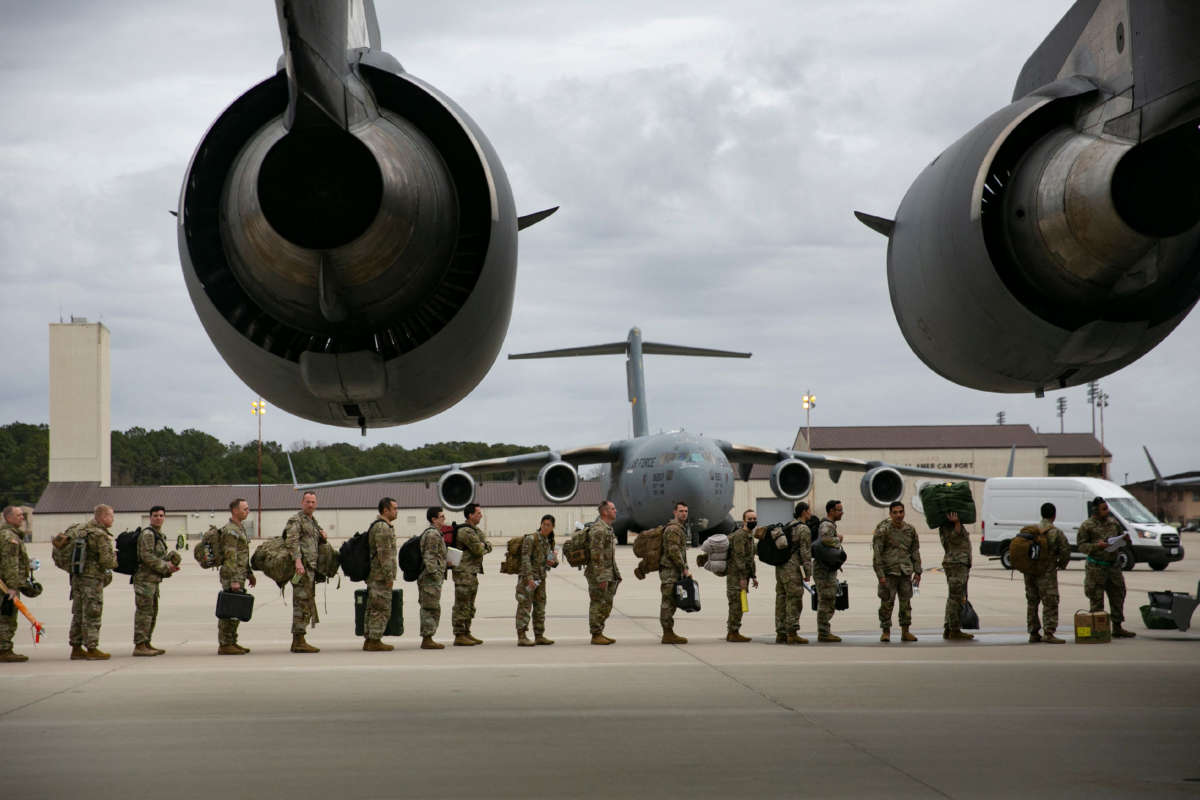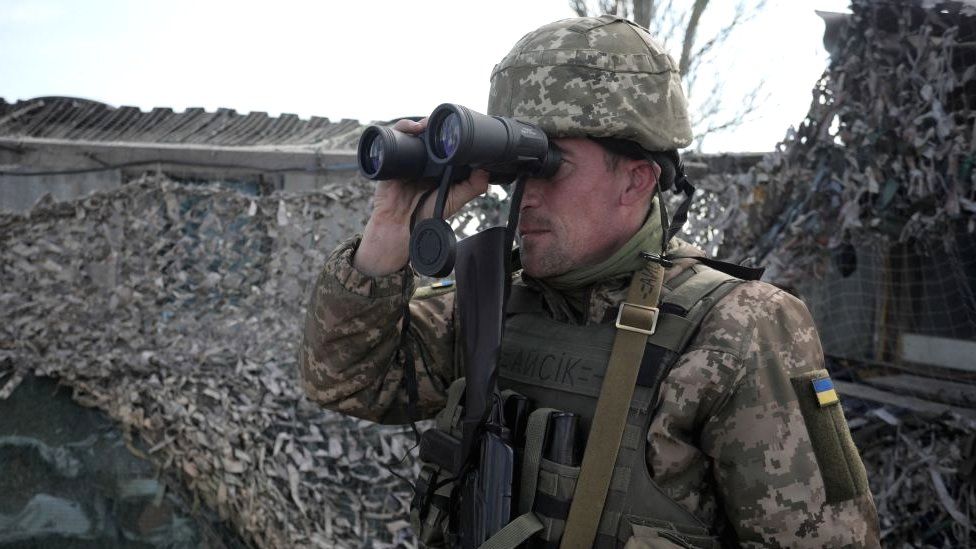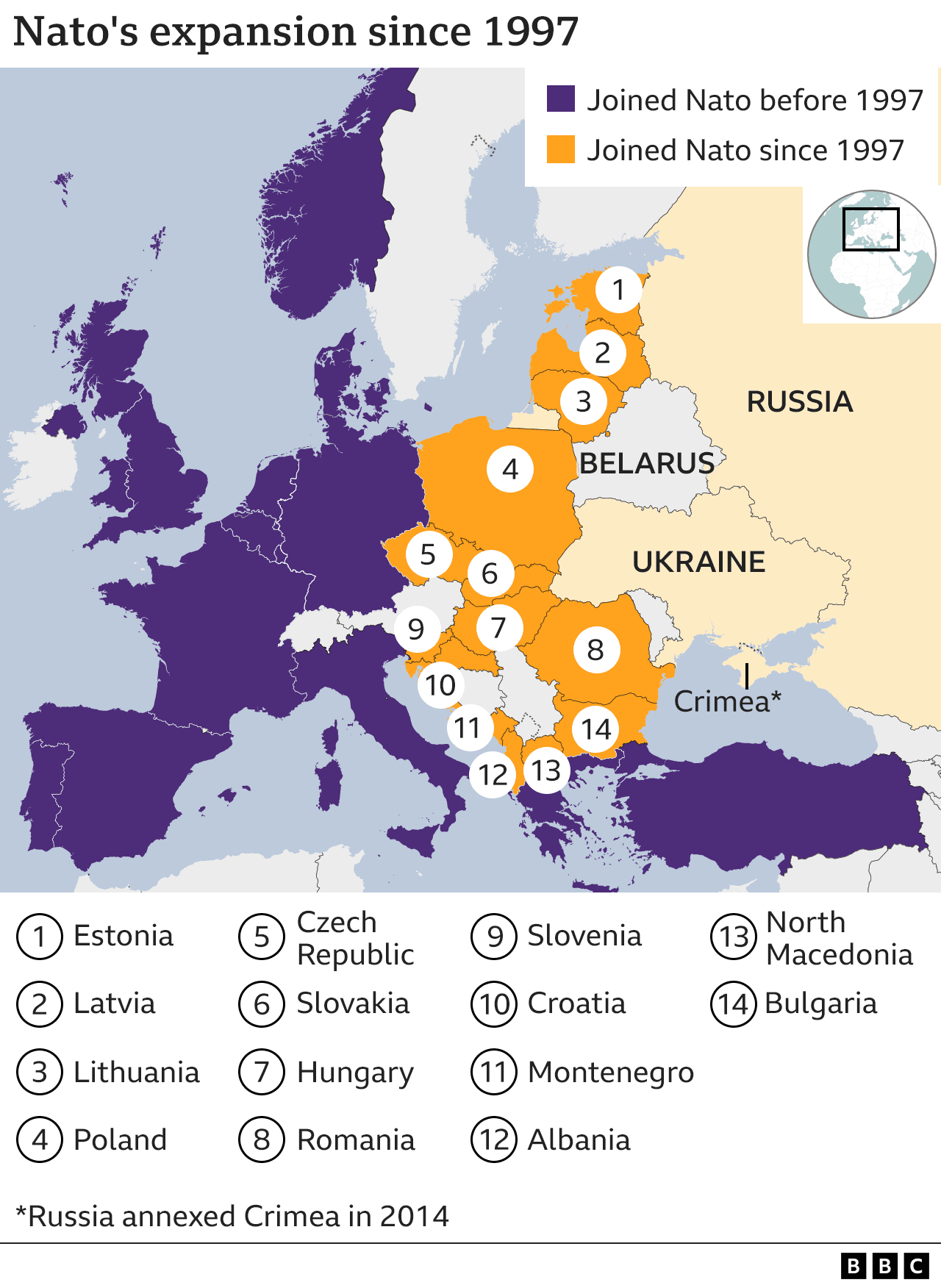Chomsky: US Approach to Ukraine and Russia Has “Left the Domain of Rational Discourse”
The Russia-Ukraine crisis continues unabated as the United States ignores all of Russian President Vladmir Putin’s security demands and spreads a frenzy of fear by claiming that a Russian invasion of Ukraine is imminent.
In a new exclusive interview for Truthout on the ongoing Russia-Ukraine crisis, world-renowned public intellectual Noam Chomsky outlines the deadly dangers of U.S. intransigence over Ukrainian membership in the North Atlantic Treaty Organization (NATO) even when key Western allies have already vetoed earlier U.S. efforts in that direction. He also seeks to shed some light on the reasons why Republicans today seem to be divided on Russia.
Chomsky — whose intellectual contributions have been compared to those of Galileo, Newton and Descartes — has had tremendous influence on a variety of areas of scholarly and scientific inquiry, including linguistics, logic and mathematics, computer science, psychology, media studies, philosophy, politics and international affairs. He is the author of some 150 books and recipient of scores of highly prestigious awards including the Sydney Peace Prize and the Kyoto Prize (Japan’s equivalent of the Nobel Prize), as well as dozens of honorary doctorate degrees from the world’s most renowned universities. Chomsky is Institute Professor Emeritus at the Massachusetts Institute of Technology and currently Laureate Professor at the University of Arizona.
The following transcript has been lightly edited for length and clarity.
Get our free emails
C.J. Polychroniou: Tensions continue to escalate between Russia and Ukraine, and there is little room for optimism since the U.S. offer for de-escalation fails to meet any of Russia’s security demands. As such, wouldn’t it be more accurate to say that the Russia-Ukraine border crisis stems in reality from the U.S.’s intransigent position over Ukrainian membership in NATO? In the same context, is it hard to imagine what might have been Washington’s response to the hypothetical event that Mexico wanted to join a Moscow-driven military alliance?
Noam Chomsky: We hardly need to linger on the latter question. No country would dare to make such a move in what former President Franklin Delano Roosevelt’s Secretary of War Henry Stimson called “Our little region over here,” when he was condemning all spheres of influence (except for our own — which in reality, is hardly limited to the Western hemisphere). Secretary of State Antony Blinken is no less adamant today in condemning Russia’s claim to a “sphere of influence,” a concept we firmly reject (with the same reservation).
There was of course one famous case when a country in our little region came close to a military alliance with Russia, the 1962 missile crisis. The circumstances, however, were quite unlike Ukraine. President John F. Kennedy was escalating his terrorist war against Cuba to a threat of invasion; Ukraine, in sharp contrast, faces threats as a result of its potentially joining a hostile military alliance. Soviet leader Nikita Khrushchev’s reckless decision to provide Cuba with missiles was also an effort to slightly rectify the enormous U.S. preponderance of military force after JFK had responded to Khrushchev’s offer of mutual reduction of offensive weapons with the largest military buildup in peacetime history, though the U.S. was already far ahead. We know what that led to.
The tensions over Ukraine are extremely severe, with Russia’s concentration of military forces at Ukraine’s borders. The Russian position has been quite explicit for some time. It was stated clearly by Foreign Minister Sergei Lavrov at his press conference at the United Nations: “The main issue is our clear position on the inadmissibility of further expansion of NATO to the East and the deployment of strike weapons that could threaten the territory of the Russian Federation.” Much the same was reiterated shortly after by Putin, as he had often said before.
There is a simple way to deal with deployment of weapons: Don’t deploy them. There is no justification for doing so. The U.S. may claim that they are defensive, but Russia surely doesn’t see it that way, and with reason.
The question of further expansion is more complex. The issue goes back over 30 years, to when the Union of Soviet Socialist Republics was collapsing. There were extensive negotiations among Russia, the U.S. and Germany. (The core issue was German unification.) Two visions were presented. Soviet leader Mikhail Gorbachev proposed a Eurasian security system from Lisbon to Vladivostok with no military blocs. The U.S. rejected it: NATO stays, Russia’s Warsaw Pact disappears.
For obvious reasons, German reunification within a hostile military alliance is no small matter for Russia. Nevertheless, Gorbachev agreed to it, with a quid pro quo: No expansion to the East. President George H.W. Bush and Secretary of State James Baker agreed. In their words to Gorbachev: “Not only for the Soviet Union but for other European countries as well, it is important to have guarantees that if the United States keeps its presence in Germany within the framework of NATO, not an inch of NATO’s present military jurisdiction will spread in an eastern direction.”
“East” meant East Germany. No one had a thought about anything beyond, at least in public. That’s agreed on all sides. German leaders were even more explicit about it. They were overjoyed just to have Russian agreement to unification, and the last thing they wanted was new problems.
There is extensive scholarship on the matter — Mary Sarotte, Joshua Shifrinson, and others, debating exactly who said what, what they meant, what’s its status, and so on. It is interesting and illuminating work, but what it comes down to, when the dust settles, is what I quoted from the declassified record.
President H.W. Bush pretty much lived up to these commitments. So did President Bill Clinton at first, until 1999, the 50th anniversary of NATO; with an eye on the Polish vote in the upcoming election, some have speculated. He admitted Poland, Hungary and the Czech Republic to NATO. President George W. Bush — the lovable goofy grandpa who was celebrated in the press on the 20th anniversary of his invasion of Afghanistan — let down all the bars. He brought in the Baltic states and others. In 2008, he invited Ukraine to join NATO, poking the bear in the eye. Ukraine is Russia’s geostrategic heartland, apart from intimate historic relations and a large Russia-oriented population. Germany and France vetoed Bush’s reckless invitation, but it’s still on the table. No Russian leader would accept that, surely not Gorbachev, as he made clear.
As in the case of deployment of offensive weapons on the Russian border, there is a straightforward answer. Ukraine can have the same status as Austria and two Nordic countries throughout the whole Cold War: neutral, but tightly linked to the West and quite secure, part of the European Union to the extent they chose to be.
The U.S. adamantly rejects this outcome, loftily proclaiming its passionate dedication to the sovereignty of nations, which cannot be infringed: Ukraine’s right to join NATO must be honored. This principled stand may be lauded in the U.S., but it surely is eliciting loud guffaws in much of the world, including the Kremlin. The world is hardly unaware of our inspiring dedication to sovereignty, notably in the three cases that particularly enraged Russia: Iraq, Libya and Kosovo-Serbia.
Iraq need not be discussed: U.S. aggression enraged almost everyone. The NATO assaults on Libya and Serbia, both a slap in Russia’s face during its sharp decline in the ‘90s, is clothed in righteous humanitarian terms in U.S. propaganda. It all quickly dissolves under scrutiny, as amply documented elsewhere. And the richer record of U.S. reverence for the sovereignty of nations needs no review.
It is sometimes claimed that NATO membership increases security for Poland and others. A much stronger case can be made that NATO membership threatens their security by heightening tensions. Historian Richard Sakwa, a specialist on East Europe, observed that “NATO’s existence became justified by the need to manage threats provoked by its enlargement” — a plausible judgment.
There is much more to say about Ukraine and how to deal with the very dangerous and mounting crisis there, but perhaps this is enough to suggest that there is no need to inflame the situation and to move on to what might well turn out to be a catastrophic war.
There is, in fact, a surreal quality to the U.S. rejection of Austrian-style neutrality for Ukraine. U.S. policy makers know perfectly well that admission of Ukraine to NATO is not an option for the foreseeable future. We can, of course, put aside the ridiculous posturing about the sanctity of sovereignty. So, for the sake of a principle in which they do not believe for a moment, and in pursuit of an objective that they know is out of reach, the U.S. is risking what may turn into a shocking catastrophe. On the surface, it seems incomprehensible, but there are plausible imperial calculations.
We might ask why Putin has taken such a belligerent stance on the ground. There is a cottage industry seeking to solve this mystery: Is he a madman? Is he planning to force Europe to become a Russian satellite? What is he up to?
One way to find out is to listen to what he says: For years, Putin has tried to induce the U.S. to pay some attention to the requests that he and Foreign Minister Lavrov repeated, in vain. One possibility is that the show of force is a way to achieve this objective. That has been suggested by well-informed analysts. If so, it seems to have succeeded, at least in a limited way.
Germany and France have already vetoed earlier U.S. efforts to offer membership to Ukraine. So why is the U.S. so keen on NATO expansion eastward to the point of treating a Russian invasion of Ukraine as imminent, even when Ukrainian leaders themselves don’t seem to think so? And since when did Ukraine come to represent a beacon of democracy?
It is indeed curious to watch what is unfolding. The U.S. is vigorously fanning the flames while Ukraine is asking it to tone down the rhetoric. While there is much turmoil about why the demon Putin is acting as he is, U.S. motives are rarely subject to scrutiny. The reason is familiar: By definition, U.S. motives are noble, even if its efforts to implement them are perhaps misguided.
Nevertheless, the question might merit some thought, at least by “the wild men in the wings,” to borrow former National Security Advisor McGeorge Bundy’s phrase, referring to those incorrigible figures who dare to subject Washington to the standards applied elsewhere.
A possible answer is suggested by a famous slogan about the purpose of NATO: to keep Russia out, to keep Germany down and to keep the U.S. in. Russia is out, far out. Germany is down. What remains is the question whether the U.S. will be in Europe — more accurately, should be in charge. Not all have quietly accepted this principle of world affairs, among them: Charles de Gaulle, who advanced his concept of Europe from the Atlantic to the Ural’s; former German Chancellor Willy Brandt’s Ostpolitik; and French President Emmanuel Macron, with his current diplomatic initiatives that are causing much displeasure in Washington.
If the Ukraine crisis is resolved peacefully, it will be a European affair, breaking from the post-World War II “Atlanticist” conception that places the U.S. firmly in the driver’s seat. It might even be a precedent for further moves toward European independence, maybe even moving toward Gorbachev’s vision. With China’s Belt-and-Road initiative encroaching from the East, much larger issues of global order arise.
As virtually always in the past when it comes to foreign affairs, we see a bipartisan frenzy over Ukraine. However, while Republicans in Congress are urging President Joe Biden to adopt a more aggressive stance toward Russia, the proto-fascist base is questioning the party line. Why, and what does the split among Republicans over Ukraine tell us about what is happening to the Republicans?
One cannot easily speak of today’s Republican Party as if it were a genuine political party participating in a functioning democracy. More apt is the description of the organization as “a radical insurgency — ideologically extreme, scornful of facts and compromise, and dismissive of the legitimacy of its political opposition.” This characterization by political analysts Thomas Mann and Norman Ornstein of the American Enterprise is from a decade ago, pre-Donald Trump. By now it’s far out of date. In the acronym “GOP,” what remains is “O.”
I don’t know whether the popular base that Trump has whipped up into a worshipful cult is questioning the aggressive stance of Republican leaders, or if they even care. Evidence is skimpy. Leading right-wing figures closely associated with the GOP are moving well to the right of European opinion, and of the stance of those who hope to retain some semblance of democracy in the U.S. They are going even beyond Trump in their enthusiastic support for Hungarian President Viktor Orban’s “illiberal democracy,” extolling it for saving Western civilization, no less.
This effusive welcome for Orban’s dismantling of democracy might bring to mind the praise for Italian fascist leader Benito Mussolini for having “saved European civilization [so that] the merit that Fascism has thereby won for itself will live on eternally in history”; the thoughts of the revered founder of the neoliberal movement that has reigned for the past 40 years, Ludwig von Mises, in his 1927 classic Liberalism.
Fox News commentator Tucker Carlson has been the most outspoken of the enthusiasts. Many Republican senators either go along with him or claim ignorance of what Orban is doing, a remarkable confession of illiteracy at the peak of global power. The highly regarded senior Sen. Charles Grassley reports that he knows about Hungary only from Carlson’s TV expositions, and approves. Such performances tell us a good deal about the radical insurgency. On Ukraine, breaking with the GOP leadership, Carlson asks why we should take any position on a quarrel between “foreign countries that don’t care anything about the United States.”
Whatever one’s views on international affairs, it’s clear that we’ve left the domain of rational discourse far behind, and are moving into territory with an unattractive history, to put it mildly.






